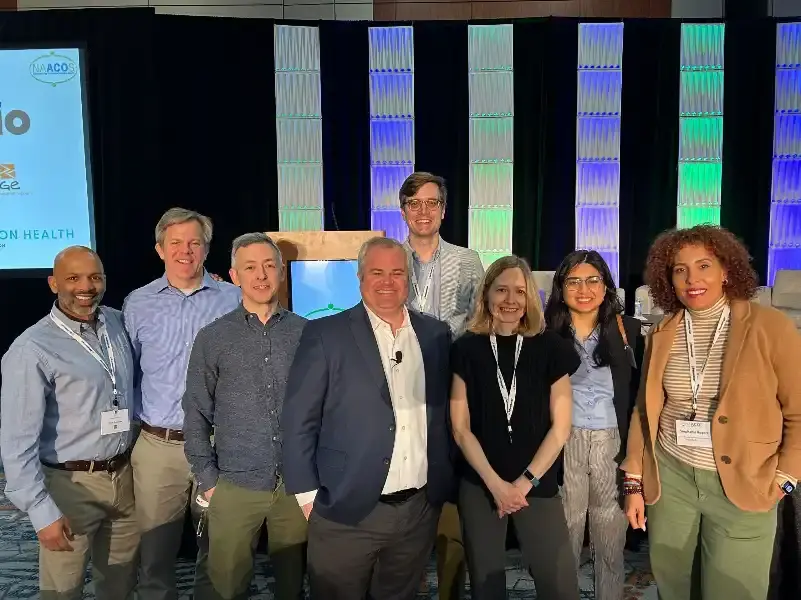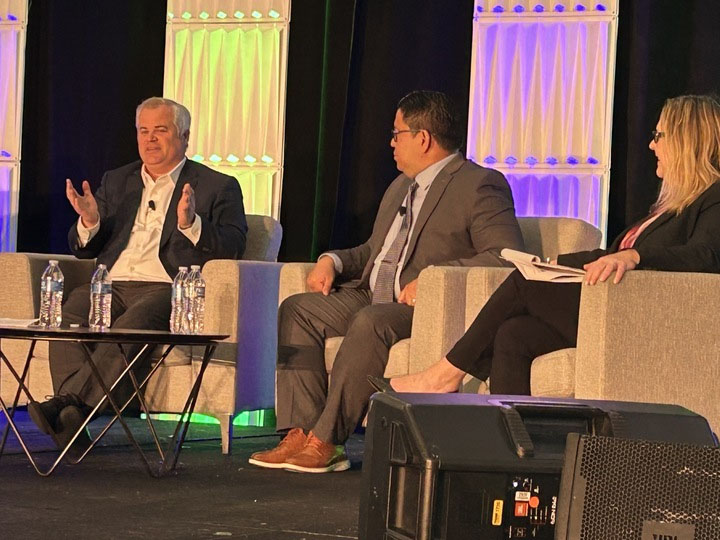The ACO community gathers with CMS leadership to discuss challenges and successes at the NAACOS Spring Conference
April 18, 2024

“More than 200,000 Medicare beneficiaries didn’t go the hospital in 2022 because of the Medicare Shared Savings Program (MSSP),” explained Travis Broome, Aledade’s Senior Vice President of Policy and Economics, to the audience of the National Association of Accountable Care Organizations’ (NAACOS) annual spring conference. Broome participated in a plenary session that featured a discussion on key strategies to advance value-based care among NAACOS, the American Medical Association, and AHIP, the national association of health plans. More than 200,000 families didn’t get panicked phone calls about their loved ones being admitted to the hospital, said Broome, as a result of the ACO model. The model rewards high quality care and evidence-based services based on outcomes rather than the volume of services they deliver. How were those hospitalizations prevented? One of the greatest strengths of the model is every ACO has different strategies tailored to their communities working towards the same outcome: better health for patients. At the core of all those strategies is more engaged primary care and better prevention.
The ACO community gathered in Baltimore as they do every spring to hear from CMS leadership and share best practices and strategies for success. In the breaking news category, NAACOS President and CEO Clif Gaus announced he will retire this fall after co-founding and leading the organization since 2012. Speakers throughout the conference took the opportunity to thank Gaus and recognize his years of service and leadership, as he steered NAACOS through multiple overhauls of MSSP and the introduction of many new models out of the CMS Innovation Center.
Conference participants had many opportunities to engage directly with CMS leadership, ask questions and share their concerns. Top of mind for many was quality measurement reporting, as CMS aims to streamline measure sets across programs. Because achieving better quality measurement doesn’t always equate to the ultimate goal of better care and outcomes, one audience member urged CMS to commit to improving blood pressure management, a core quality measure in every contract. CMS could likely embrace such an initiative, responded Michelle Schreiber, CMS’s Deputy Director of Center for Clinical Standards and Quality and Director of the Quality Measurement and Value-based Incentives Group. Schreiber referenced the cross agency approach to health equity and how powerful it can be when all stakeholders join forces to advance a common goal.
Another topic raised in several sessions by participants was the need for timely information on the recently launched ACO Primary Care Flex Model. Participants let CMS leadership know that they were having active discussions with clinicians and ACO leadership about Flex but faced difficulty making any decisions without more details on the payment structure and amount. CMS Chief Strategy Officer Purva Rawal assured the audience that the amount of the enhanced payment would be generous enough to provide services associated with advanced primary care. However, Rawal declined to give more details before the official release of the Request for Applications, which is expected some time in late May.
Throughout the conference, in addition to the opportunities to engage with CMS, there were learning sessions ranging from how to succeed as an ACO, using artificial intelligence and machine learning, addressing social drivers of health, advancing end of life care, and so much more. ACOs shared their experiences so everyone can improve health even further in the years ahead.
Aledade’s Broome posed this question during the plenary to set the stage for what is ahead: “How do we set incentives to turn those 200,000 avoided hospitalizations into 400,000 avoided hospitalizations, and later, a million?” Many participants were likely pondering that question as they drove and flew out of Baltimore. With fresh perspectives from two intense days of learning and sharing, the opening of applications for MSSP on May 20 and Flex around the same time, Spring is a very busy season for ACOs.

Connect with us!
Start planning your value-based care journey now
Thousands of your primary care peers are choosing Aledade as their value-based care partner. Let our experts show you why.
